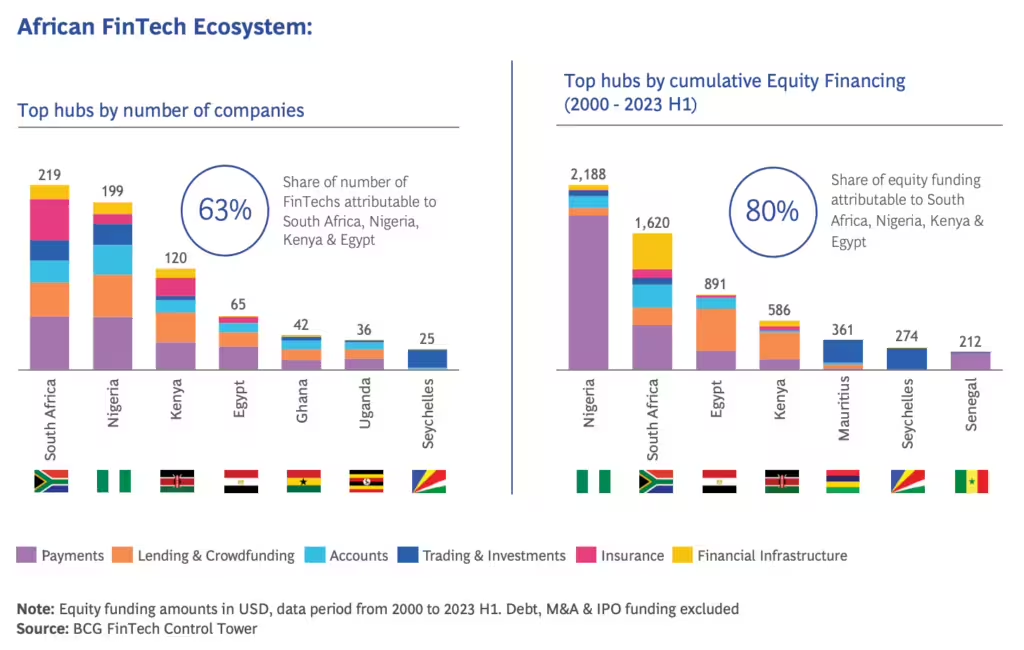- Nigeria stablecoin transactions account for 43% of Africa’s crypto volume, driven by USD Coin and Tether adoption amid currency instability.
- Nigeria’s 1.1M Web3 developers and $130M startup funding position it as Africa’s DeFi and stablecoin innovation hub.
- SEC’s ARIP licenses signal regulatory progress, but Nigeria’s crackdown on digital assets clashes with stablecoin growth.
In a continent where currency instability and limited banking access have stifled growth, digital assets are a key narrative shift.
Surging Nigeria stablecoin transactions alongside other regions, i.e. Kenya, South Africa and others, Africa’s on-chain crypto value now stands at $125 billion, a $7.5 billion year-over-year rise.
With Nigeria contributing almost half of the volume, it showcases why this region continues leading Africa into digital assets.
Let’s unpack what this means for the average trader and developer, and its rippling effect throughout Africa’s landscape.
Nigeria stablecoin transactions drive Africa’s $125B on-chain economy.
What’s Going On; A $125 B Digital Economy Takes Shape.
Sub-Saharan Africa has broken previous expectations once more by collectively attaining an on-chain value of $125 billion by Q1 2025.
This, however, isn’t merely accidental but is brought about by the steady diligence of governments, the unyielding will of traders and the rapid rise of stablecoin.
The latter plays a major role in Africa’s highest crypto trading region, Nigeria.
Nigeria has been a long-time player in the global crypto space, being one of the first in Africa and South Africa.
Like many other African nations, currency instability has driven many to seek alternatives, but Nigeria’s stablecoin transactions have skyrocketed in the past decade.
This account accounts for roughly 43% of the region’s crypto transactions, citing assets like USD Coin and Tether as the leading option.
In 2024, transfers under $1 million reached nearly $3 billion, showcasing the resilience of the regions’ processes in peer-to-peer stablecoin transactions.
In addition, the demand for a currency instability solution is increasing, forcing the region to become a Web3 developer hub, birthing well-known players like Flutterwave and Yellow Card.
CHECK OUT: Is Nigeria Web3 Ecosystem a Goldmine? $3B Stablecoin Data Reveals
In a recent report from Hashed Emergent, Nigeria accounted for 4% of all new Web3 developers globally, the highest within the continent. This figure has grown by 28%, reaching over 1.1 million.
DeFi for unbanked individuals is often the primary driving force of this figure, prompting many investors to tap into Nigeria’s lucrative transaction volume.
Nigeria stablecoin transactions, Nigerian crypto regulations, web3 developer hub, Bitcoin mining opportunities, peer-to-peer stablecoin transactions, currency instability solutions, DeFi for unbanked individuals
Implications Across Stakeholder Groups
Investors, Traders & Miners
Nigeria’s Bitcoin mining opportunities have also been cited with BTC climbing past the $100K mark within the week. However, Nigeria does fall short, with Ethiopia leading in bitcoin mining opportunities due to differences in energy production.
Despite this, Nigerian stablecoin transactions have surged, with many platforms providing citizens with alternative income.
In 2024 alone, more than 80 Nigerian web3 startups raised a cumulative $130 million, showcasing the growing demand for better remittance solutions.
It provides investors with many choices and bridges to various sectors, not just DeFi.

Developers & Entrepreneurs
Nigeria’s explosive growth has spawned a vibrant web3 developer hub with many startups tracing their roots. Nigeria accounts for 3% of the world’s blockchain developers, having over 300,000 active developers within the space.
With these figures and a survey of at least 800 developers, over half have full-time jobs within the space. Startups focus on peer-to-peer stablecoin transactions and cross-chain interoperability to bridge the gap years of financial exclusion that have developed.
Policy Makers & Regulators
Nigerian crypto regulations have slightly improved over the years. The SEC’s Accelerated Regulatory Incubation Programme (ARIP) granted provisional licenses to platforms like Quidax and Busha, signalling clarity.
In addition, the region’s recent change of heart from a restrictive regulatory outlook to a more accommodating policy signifies a major shift.
Despite this, the nation is still cracking down against digital assets, hoping to revive its fluctuating naira and eNaira. This has prompted various blockchain initiatives, i.e., the Zone’s recent regulated blockchain ecosystem.
Why This Matters for Africa’s Future
Nigeria’s crypto revolution isn’t just about technology but a representation of Africa’s radical shift. Peer-to-peer stablecoin transactions are replacing unstable currencies, providing better markets for businesses.
The recent initiatives to develop regulatory frameworks are a green light for startups to keep up with compliance and provide better services without hindrance from the governments.
As global Web3 infrastructure players look to expand and scale into Africa, Nigeria offers a blend of scale, engineering talent and financial needs aligning with Web3’s core value propositions.
A Blueprint for Africa’s Digital Future
Nigeria’s stablecoin dominance, developer surge and adaptive regulations showcase the tangible benefits of Web3: lower remittance costs, currency stability, and inclusive financial services.
As you consider your next move—deploying capital, building dApps, or shaping policy—remember that Nigeria’s Web3 renaissance offers both high reward and responsibility.


2 comments
[…] CHECK OUT: Nigeria Stablecoin Transactions Boom: A Positive Financial Shift […]
[…] CHECK OUT:Nigeria Stablecoin Transactions Boom: A Positive Financial Shift […]